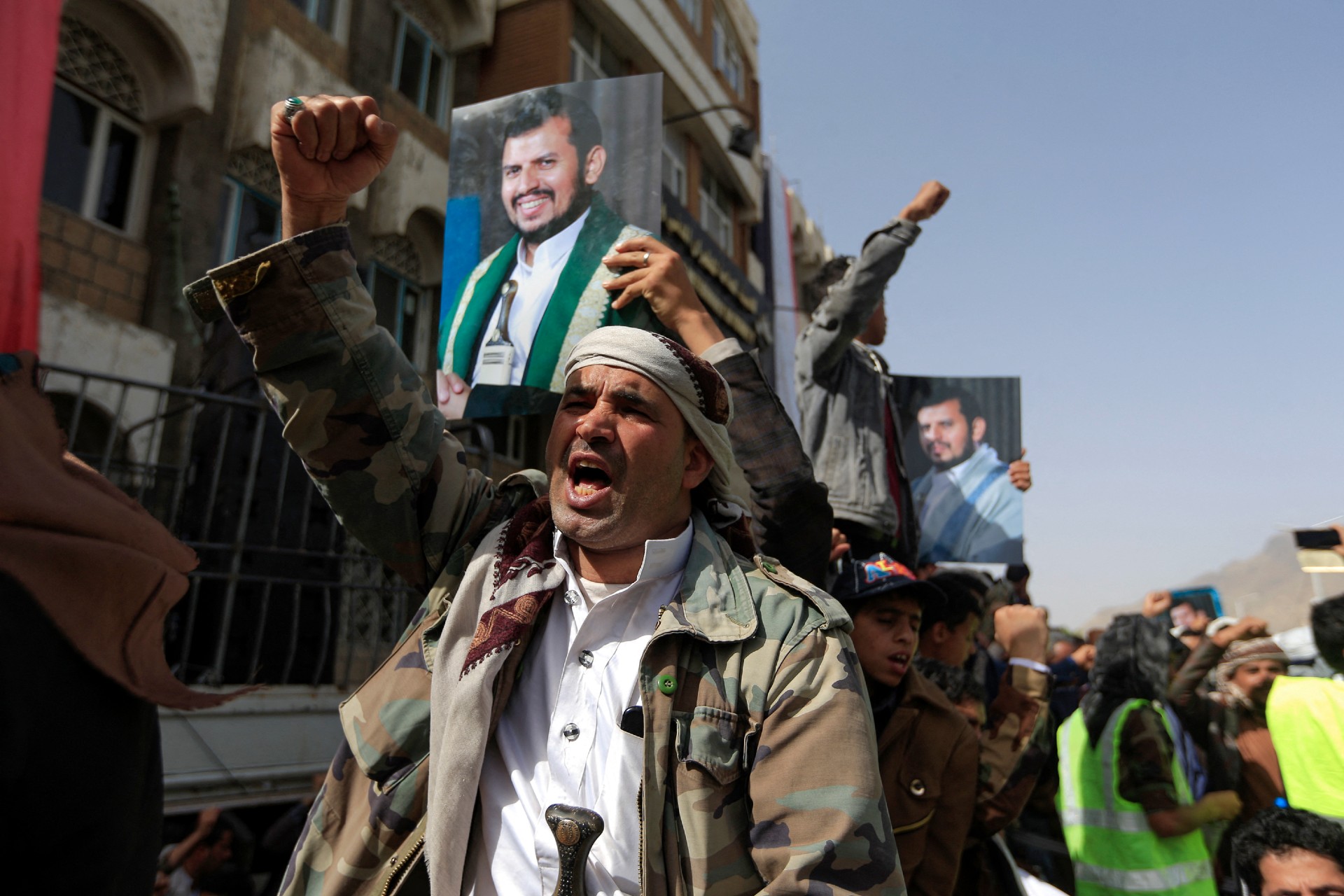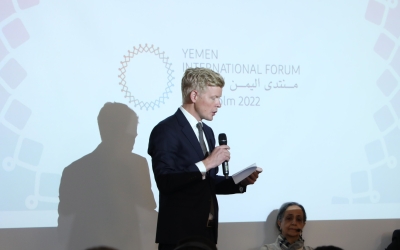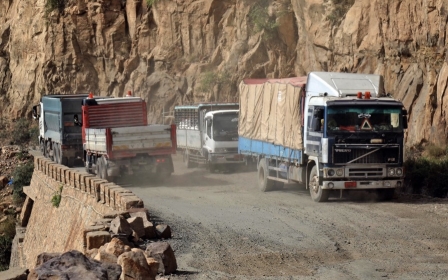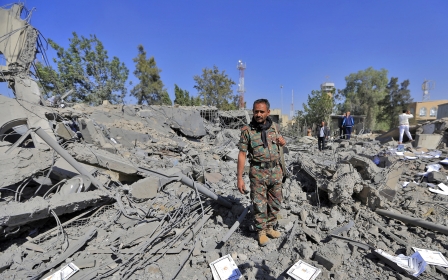Saudi-Hezbollah meeting secured Yemen ceasefire and Hadi resignation
A secret meeting between a Saudi delegation and Hezbollah in Lebanon paved the way for the ceasefire in Yemen, multiple sources have told Middle East Eye.
The meeting is extraordinary because both sides regard each other as bitter foes and Hassan Nasrallah, Hezbollah’s general secretary, has repeatedly denied acting on behalf of the Houthis in Yemen, although it is hardly a secret that the movement is trained by and models itself on the Lebanese organisation.
At the meeting in late March, Naim Qassem, Nasrallah’s deputy, presented the Saudis with a list of demands as a condition for an immediate ceasefire in Yemen.
They included the removal of Yemen's President Abd Rabbuh Mansour Hadi, the lifting of the blockade of key port city Hodeidah and Sanaa airport, and an exchange of prisoners, not all of whom were Yemeni but some who were Shias imprisoned in Bahrain and other Gulf states.
Three weeks later, most of this came to pass, although not all the prisoners on Qassem’s list were freed.
New MEE newsletter: Jerusalem Dispatch
Sign up to get the latest insights and analysis on Israel-Palestine, alongside Turkey Unpacked and other MEE newsletters
At the time, Hadi’s 18 April resignation and the transfer of his powers to a presidential council came out of the blue after eight years of Saudi backing for the Yemeni president.
The Wall Street Journal then reported that Saudi Crown Prince Mohammed bin Salman had forced him out of office and put him under effective house arrest.
But until today, the reason why the de facto Saudi ruler did that was unknown, other than a wish to extricate himself from a costly and ineffective seven-year military intervention that he had launched against the Houthis in one of his first acts as defence minister.
'The Saudis asked Qassem what would be the response of the Houthis if these demands were met. Qassem replied: ‘...there will be an immediate ceasefire’
- source briefed on meeting of Saudis and Hezbollah
According to the UN, Yemen's conflict will have killed 377,000 people by the end of 2022. An estimated four million people have been displaced, and 80 percent of the country's population of 29 million are dependent on aid.
In June the ceasefire agreement was extended. However it nearly ran into the sand after the Houthis continued military operations around the central Yemen city of Marib and its surrounding province, a Gulf source said.
In response, MEE was told, Saudi Arabia threatened to boycott the next round of talks between Saudi and Iranian delegations, which have been held in Baghdad to address regional issues on and off for months.
At that point, Iraqi Prime Minister Mustafa al-Kadhimi, who has acted as a mediator in Saudi-Iranian talks, travelled to both countries, and raised the issue with Iranian President Ebrahim Raisi on Sunday.
A statement issued by the Iraqi prime minister’s office on Sunday night said: “During the meeting, they emphasised supporting the armistice in Yemen and strengthening efforts to establish peace there, as well as stressing that a peaceful solution to the crisis should reflect the will of the Yemenis.”
Multiple sources in the Gulf and beyond confirmed the meeting in Lebanon. When approached by MEE, Hezbollah did not reply. But a source with access to the highest levels of the organisation confirmed that “the Saudis did approach Hezbollah”.
The Saudi embassy in London did not respond to a request for comment.
Houthi talks off the table
The extraordinary diplomatic move started at one of the Saudi and Iranian face-to-face meetings in Baghdad.
A Gulf source told MEE: “The Saudis asked the Iranians to open the Yemeni file. The Iranians insisted that Yemen was an independent state and that they did not intervene in Yemeni affairs. The Iranian side said the only thing they could do was on smoothing relations.”
According to the source, the Saudis said any smoothing of relations could only happen with a direct meeting between them and the Houthis.
Here accounts differ. Gulf sources say the Iranians pushed for the two sides to meet and the Houthis rejected such a meeting. Sources close to Hezbollah say the opposite. "The Saudis did not want [to meet] them because they don’t want to recognise Ansar Allah,” one source close to Hezbollah said, using the Houthi movement’s official name.
The Iranian side then offered Nasrallah as its spokesman. “The Saudis were reluctant. They stormed off, but then they came round to the idea and sent a delegation to Lebanon,” said a Gulf source.
On arrival in Beirut, the Saudi delegation was told it would be met by Qassem, not Nasrallah himself. They rejected this and immediately returned to their hotel. The next day they were contacted by Hezbollah and persuaded to meet Qassem.
The meeting lasted 25 minutes, short considering the complexity of what was being discussed.
The Saudi delegation began with standard diplomatic Middle Eastern lines: “We are all Arabs, all brothers, we must come together.” This was brushed aside by Qassem who pulled out a piece of paper and presented it to the Saudis.
It had on it a list of around a dozen demands, which began with the removal of Hadi and the installation of a broad-based presidential council, and continued with a prisoner exchange and the lifting of the siege on Hodeidah and Sanaa airport.
“The Saudis asked Qassem what would be the response of the Houthis if these demands were met. Qassem replied: ‘Once you realise we are absolutely serious, there will be an immediate ceasefire’,” a source briefed on the meeting told MEE.
Three weeks later, the Saudis began to enact these measures and the Houthis announced a ceasefire.
Though ships began docking in Hodeidah and planes once again flew through Sanaa airport, the Houthis continued to block supply routes to pro-government forces in Marib and the southern city of Taiz.
The Saudis threatened once again to pull out of their meeting with the Iranians in Baghdad if the Houthis “did not respond positively”, leading to Kadhimi’s trip to Tehran.
This article is available in French on Middle East Eye French edition.
Middle East Eye delivers independent and unrivalled coverage and analysis of the Middle East, North Africa and beyond. To learn more about republishing this content and the associated fees, please fill out this form. More about MEE can be found here.






